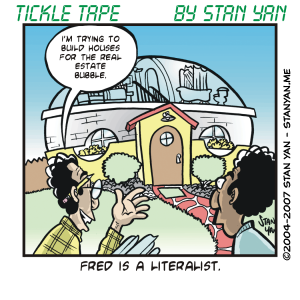Top traders are brutally honest about their performance. There’s a powerful tendency to assess our trading performance in a self-serving way. We want to feel good about ourselves, so we tend to convince ourselves that we’re doing better than we actually are. But long-term success as a trader requires that you know exactly where you stand. There are countless examples of traders who ignore their limitations, feed their trading accounts annually, and never actually achieve profitability.
It’s a shame. If they would have just objectively looked at their performance, kept track of which strategies and methods were working, and which ones were not, and repeated the winning strategies, they could have achieved profitability. It may be difficult emotionally, but facing up to our limitations is the only way long-term profitability can be achieved.
Facing limitations is difficult, especially if one is a poor performer. Psychologist Dr David Dunning argues that poor performers are “blissfully unaware of their incompetence.” They overestimate their abilities. Their intuition tells them that their performance is superior, yet objective estimates show their actual performance is under par.
For example, when people are asked to take a test measuring abilities, such as thinking logically, writing grammatically, and spotting funny jokes, they tend to overestimate their performance: they think they are performing well above average, yet their actual performance is in the bottom 25%. These biased estimates aren’t restricted to taking tests. People in a variety of settings and skill areas overestimate their abilities. Debate teams in college tournaments wrongly think they are eloquent debaters.
Hunters who are bad shots think they are expert marksmen. And medical residents think they know how to diagnose patients more accurately than they really can. Studies have even shown that when people are offered money to estimate their performance accurately, they still can’t do it. This phenomenon has also been documented in the trading realm. Behavioural economist Dr Terrance Odean, for example, has shown that online investors tend to trade beyond their skills.
They don’t have an accurate picture of what they can and cannot do, so they overtrade, and in the long run, they reduce their overall profitability. It’s vital for long-term success to keep an accurate, objective log of your performance. Don’t allow yourself to think you have more skills than you actually do. Top performers don’t overestimate their performance abilities. They try to gauge their performance as accurately as possible and tend to avoid worrying about whether they are “good performers” or not.
They live in the moment and just try to perform to the best of their ability, rather than try to convince themselves they are top performers. They see setbacks as just objective pieces of feedback, assess their implications, and take decisive action to improve matters. In the end, focusing on their immediate experience, rather than enhancing their view of themselves, helps them remain profitable.
So try to be as objective about your performance as possible. Keep in mind that your intuitive performance estimates may be extremely exaggerated. Try to ignore them. Create an objective log of your trading results, such as a trading diary. By keeping a trading diary, you will know exactly how well you are performing. And the more objective about your performance you can be, the more likely you’ll take the steps you need to achieve profitability and maintain it.


